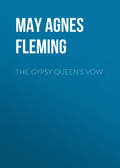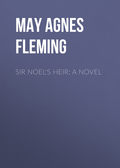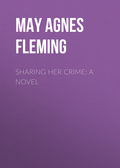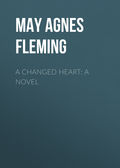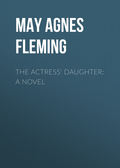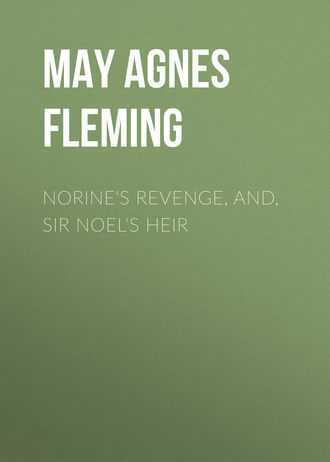
May Agnes Fleming
Norine's Revenge, and, Sir Noel's Heir
"You have come to keep your promise," the young man cried – "to tell me who I am?"
"I have come to keep my promise," Mrs. Weymore answered; "but I must speak to my lady first. I wanted to tell you that, before you sleep to-night, you shall know."
She left the studio, and the two sat there, breathless, expectant. Sir Rupert was dining at Jocyln Hall, Lady Thetford was alone, in high spirits, and Mrs. Weymore was admitted at once.
"I wonder how long you must wait?" said May Everard.
"Heaven knows! Not long, I hope, or I shall go mad with impatience."
An hour passed – two – three, and still Mrs. Weymore was closeted with my lady, and still the pair in the studio waited.
CHAPTER XII.
MRS. WEYMORE'S STORY
Lady Thetford sat up among her pillows and looked at her hired dependent with wide open eyes of astonishment. The pale, timid face of Mrs. Weymore wore a look altogether new.
"Listen to your story! My dear Mrs. Weymore, what possible interest can your story have for me?"
"More than you think, my lady. You are so much stronger to-day than usual, and Sir Rupert's marriage is so very near, that I must speak now or never."
"Sir Rupert," my lady said. "What has your story to do with Sir Rupert?"
"You will hear," Mrs. Weymore said, very sadly. "Heaven knows I should have told you long ago; but it is a story few would care to tell. A cruel and shameful story of wrong and misery; for, my lady, I have been cruelly wronged by one who was once very near to you."
Lady Thetford turned ashen white.
"Very near to me! do you mean – "
"My lady listen, and you shall hear. All those years that I have been with you, I have not been what I seemed. My name is not Weymore. My name is Thetford – as yours is."
A quick terror had settled down on my lady's face. Her lips moved, but she did not speak. Her eyes were fixed on the sad, set face before her, with a terrified, expectant stare.
"I was a widow when I came to you," Mrs. Weymore went on to say, "but, long before, I had known that worst widowhood, desertion. I ran away from my happy home, from the kindest father and mother that ever lived; I ran away, and was married and deserted before I was eighteen years old.
"He came to our village, a remote place, my lady, with a local celebrity for its trout-streams, and for nothing else. He came, the man whom I married, on a visit to the great house of the place. We had not the remotest connection with the house, or I might have known his real name. When I did know him, it was as Mr. Noel – he told me himself, and I never thought of doubting it. I was as simple and confiding as it is possible for the simplest village girl to be, and all the handsome stranger told me was gospel truth; and my life only began, I thought, from the hour I saw him first.
"I met him at the trout-streams fishing, and alone. I had come to while away the long, lazy hours under the trees. He spoke to me – the handsome stranger, whom I had seen riding through the village, beside the squire, like a young prince; and I was only too pleased and flattered by his notice. It is many years ago, Lady Thetford, and Mr. Noel took a fancy to my pink-and-white face and fair curls, as fine gentlemen will. It was only fancy – never at its best, love; or he would not have deserted me pitilessly as he did. I know it now; but then I took the tinsel for the pure gold, and would as soon have doubted the Scripture as his lightest word.
"My lady, it is a very old story, and very often told. We met by stealth and in secret; and weeks passed, and I never learned he was other than what I knew him. I loved with my whole foolish trusting heart, strongly and selfishly; and I was ready to give up home, and friends and parents – all the world for him. But not my good name, and he knew that; and my lady, we were married really and truly, and honestly married in a little church in Berkshire, and the marriage is recorded in the register in the church, and I have the marriage certificate here in my possession."
Mrs. Weymore touched her bosom as she spoke, and looked with earnest, truthful eyes at Lady Thetford. But Lady Thetford's face was averted, and not to be seen.
"His fancy for me was as fleeting as all his fancies; but it was strong enough and reckless enough, whilst it lasted, to make him forget all consequences. For it was surely a reckless act for a gentleman, such as he was, to marry the daughter of a village schoolmaster.
"There was but one witness to our marriage – my husband's servant – George Vyking. I never liked the man; he was crafty, and cunning, and treacherous, and ready for any deed of evil; but he was in his master's confidence and took a house for us at Windsor, and lived with us and kept his master's secrets well."
Mrs. Weymore paused, her hands fluttering in painful unrest. The averted face of Lady Thetford never turned, but a smothered voice bade her go on.
"A year passed, my lady, and I still lived in the house at Windsor, but quite alone now. My punishment had begun very early; two or three months sufficed to weary my husband of his childish village girl, and make him thoroughly repent his folly. I saw it from the first – he never tried to hide it from me; his absences grew longer and longer, more and more frequent, until at last he ceased coming altogether. Vyking, the valet, came and went; and Vyking told me the truth – the hard, cruel, bitter truth, that I was never to see my husband more.
"'It was the maddest act of a mad young man's life,' Vyking said to me, coolly, 'and he's repented of it, as I knew he would repent. You'll never see him again, mistress, and you needn't search for him, either. When you find last winter's snow, last autumn's partridges, then you may hope to find him.'
"'But I am his wife,' I said; 'nothing can undo that – his lawful, wedded wife.'
"'Yes,' said Vyking, 'his wife fast enough; but there's the law of divorce, and there's no witness but me alive. You can do your best; and the best you can do is to take it easy and submit. He'll provide for you handsomely; and when he gets the divorce, if you like, I'll marry you myself.'
"I had grown to expect some such revelation, I had been neglected so long. My lady, I don't speak of my feelings, my anguish and shame, and remorse and despair. – I only tell you here simple facts. But in the days and weeks which followed, I suffered as I never can suffer again in this world.
"I was held little better than a prisoner in the house at Windsor after that; and I think Vyking never gave up the hope that I would one day consent to marry him. More than once I tried to run away, to get on the track of my betrayer, but always to be met and foiled. I have gone down on my knees to that man Vyking, but I might as well have knelt to a statue of stone.
"'I'll tell you what we'll do,' he said, 'we'll go to London. People are beginning to look and talk about here; there they know how to mind their own business.'
"I consented readily enough. My one hope now was to find the man who had wronged me, and in London I thought I stood a better chance than at Windsor. We started, Vyking and I; but driving to the station we met with an accident, our horse ran away and I was thrown out; after that I hardly remember anything for a long time.
"Weeks passed before I recovered. Then I was told my baby had been born and died. I listened in a sort of dull apathy; I had suffered so much that the sense of suffering was dulled and blunted. I knew Vyking well enough not to trust him or believe him; but I was powerless to act, and could only turn my face to the wall and pray to die.
"But I grew strong, and Vyking took me to London, and left me in respectably-furnished lodgings. I might have escaped easily enough here, but the energy even to wish for freedom was gone; I sat all day long in a state of miserable, listless languor, heart-weary, heart-sick, worn-out.
"One day Vyking came to my rooms in a furious state of passion. He and his master had quarrelled. I never knew about what; and Vyking had been ignominiously dismissed. The valet tore up and down my little parlor in a towering passion.
"'I'll make Sir Noel pay for it, or my name's not Vyking,' he cried. 'He thinks because he's married an heiress he can defy me now. But there's law in this land to punish bigamy; and I'll have him up for bigamy the moment he's back from his wedding-tour.'
"I turned, and looked at him, but very quietly. 'Sir Noel?' I said. 'Do you mean my husband?'
"'I mean Miss Vandeleur's husband now,' said Vyking. 'You'll never see him again, my girl. Yes, he's Sir Noel Thetford, of Thetford Towers, Devonshire; and you can go and call on his pretty new wife as soon as she comes home.'
"I turned away and looked out of the window without a word. Vyking looked at me curiously.
"'Oh! we've got over it, have we; and we're going to take it easy, and not make a scene. Now that's what I call sensible. And you'll come forward and swear Sir Noel guilty of bigamy?'
"'No,' I said, 'I never will!'
"'You won't – and why not?'
"'Never mind why. I don't think you would understand if I told you – only I won't.'
"'Couldn't you be coaxed?'
"'No.'
"'Don't be too sure. Perhaps I could tell you something might move you, quiet as you are. What if I told you your baby did not die that time, but was alive and well?'
"I knew a scene was worse than useless with this man, tears and entreaties thrown away. I heard his last words, and started to my feet with outstretched hands.
"'Vyking, for the dear Lord's sake, have pity on a desolate woman, and tell me the truth.'
"'I am telling you the truth. Your boy is alive and well, and I've christened him Guy – Guy Vyking. Don't you be scared – he's all safe; and the day you appear in court against Sir Noel, that day he shall be restored to you. Now don't you go and get excited; think it over, and let me know your decision when I come back.'
"He left the room before I could answer, and I never saw Vyking again. The next day, reading the morning paper, I saw the arrest of a pair of housebreakers, and the name of the chief was George Vyking, late valet to Sir Noel Thetford. I tried to get to see him in prison, but failed. His trial came on, his sentence was transportation for ten years; and Vyking left England, carrying my secret with him.
"I had something left to live for now – the thought of my child. But where was I to find him, where to look? I, who had not a penny in the wide world. If I had had the means, I would have come to Devonshire to seek out the man who had so basely wronged me; but as I was, I could as soon have gone to the antipodes. Oh! it was a bitter, bitter time, that long, hard struggle with starvation – a time it chills my blood even now to look back upon.
"I was still in London, battling with grim poverty, when, six months later, I read in the Times the awfully sudden death of Sir Noel Thetford, Baronet.
"My lady, I am not speaking of the effect of that blow – I dare not to you, as deeply wronged as myself. You were with him in his dying moments, and surely he told you the truth then; surely he acknowledged the great wrong he had done you?"
Mrs. Weymore paused, and Lady Thetford turned her face, her ghastly, white face, for the first time, to answer.
"He did – he told me all; I know your story to be true."
"Thank God! Oh, thank God! And he acknowledged his first marriage?"
"Yes; the wrong he did you was venial to that which he did me – I, who never was his wife, never for one poor moment had a right to his name."
Mrs. Weymore sunk down on her knees by the couch and passionately kissed the lady's hand.
"My lady! my lady! And you will forgive me for coming here? I did not know, when I answered Mr. Knight's advertisement, where I was coming; and when I did I could not resist the temptation of looking on his son. Oh, my lady! you will forgive me, and bear witness to the truth of my story."
"I will; I always meant to before I died. And that young man – that Guy Legard – you know he is your son?"
"I knew it from the first. My lady, you will let me tell him at once, will you not? And Sir Rupert? Oh, my lady! he ought to know."
Lady Thetford covered her face with a groan. "I promised his father on his death-bed to tell him long ago, to seek for his rightful heir – and see how I have kept my word. But I could not – I could not! It was not in human nature – not in such a nature as mine, wronged as I have been."
"But now – oh, my dear lady! now you will?"
"Yes, now, on the verge of the grave, I may surely speak. I dare not die with my promise unkept. This very night," Lady Thetford cried, sitting up, flushed and excited, "my boy shall know all – he shall not marry in ignorance of whom he really is. Aileen has the fortune of a princess; and Aileen will not love him less for the title he must lose. When he comes home, Mrs. Weymore, send him to me, and send your son with him, and I will tell them all."
CHAPTER XIII.
"THERE IS MANY A SLIP."
A room that was like a picture – a carpet of rose-buds gleaming through rich-green moss, lounges piled with downy-silk pillows, a bed curtained in lace, foamy white, plump, and tempting, fluted panels, and delicious little medallion pictures of celebrated beauties smiling down from the pink-tinted back-ground; a pretty room – Aileen Jocyln's chambre-a-coucher, and looking like a picture herself, in a loose, flowing morning-robe, all ungirdled, the rich, dark hair falling heavy and unbound to her waist, Aileen Jocyln lay among piles of cushions, like some young Eastern Sultana.
Lay and mused with, oh! such an infinitely happy smile upon her exquisite face; mused, as happy youth, loving and beloved, upon its bridal-eve does muse. Nay, on her bridal-day, for the dainty little French clock on the bracket, was pointing its golden hands to three.
The house was very still; all had retired late, busy with preparations for the morrow, and Miss Jocyln had just dismissed her maid. Every one, probably, but herself, was asleep; and she, in her unutterable bliss, was too happy for slumber. She arose, presently, walked to the window and looked out. The late-setting moon still swung in the sky; the stars still spangled the cloudless blue, and shone serene on the purple bosom of the far-spreading sea; but in the East the first pale glimmer of the new day shone – her happy wedding-day. The girl slid down on her knees, her hands clasped, her radiant face, glorified with love and bliss, turned ecstatically, as some faithful follower of the Prophet might, to that rising glory of the East.
"Oh!" Aileen thought, gazing around over the dark, deep sea, the star-gemmed sky, and the green radiance and sweetness of the earth, "what a beautiful, blissful world it is, and I the happiest creature in it!"
She returned to her cushions, and fell asleep; slept and dreamed dreams as joyful as her waking thoughts, and no shadow of that gathering cloud that was to blacken all her world so soon, fell upon her.
Hours passed, and still Aileen slept. Then came an imperative knock at her door – again and again, louder each time; and then Aileen started up, fully awake. Her room was flooded with sunshine, countless birds sang in the swaying green gloom of the branches, and the ceaseless sea was all aglitter with sparkling sunlight.
"Come in," Miss Jocyln said. It was her maid, she thought – and she walked over to an arm-chair, and composedly sat down.
The door opened, and Colonel Jocyln, not Fanchon, appeared, an open note in his hand, his face full of trouble.
"Papa!" Aileen cried, starting up in alarm.
"Bad news, my daughter – very bad! very sorrowful! Read that."
The note was very brief, in a spidery, female hand.
"Dear Colonel Jocyln – We are in the greatest trouble. Poor Lady Thetford died with awful suddenness this morning, in one of those dreadful spasms. We are all nearly distracted. Rupert bears it better than any of us. Pray come over as soon as you can.
"May Everard."
Aileen Jocyln sunk back in her seat, pale and trembling.
"Dead! O papa! papa!"
"It is very sad, my dear, and very shocking; and terribly unfortunate that it should have occurred just at this time. A postponed wedding is ever ominous of evil."
"Oh! pray, papa, don't think of that. Don't think of me! Poor Lady Thetford! Poor Rupert! You will go over at once, papa, will you not?"
"Certainly, my dear. And I will tell the servants, so that when our guests arrive, you may not be disturbed. Since it was to be," muttered the Indian officer under his mustache, "I would give half my fortune that it had been one day later. A postponed marriage is the most ominous thing under the sun."
He left the room, and Aileen sat with her hands clasped, and an unutterable awe overpowering every other feeling. She forgot her own disappointment in the awful mystery of sudden death. Her share of the trial was light – a year of waiting, more or less; what did it matter, since Rupert loved her unchangeably; but, poor Lady Thetford, called away in one instant from earth, and all she held most dear, on her son's wedding-day. And then Aileen, remembering how much the dead woman had loved her, and how fondly she had welcomed her as a daughter, covered her face with her hands, and wept as she might have wept for her own mother.
"I never knew a mother's love or care," Aileen thought; "and I was doubly happy in knowing I was to have one at last. And now – and now – "
It was a drearily long morning to the poor bride elect, sitting alone in her chamber, or pacing restlessly up and down. She heard the roll of carriages up the drive, the pause that ensued, and then their departure. She wondered how he bore it; best of all, May had said; but then he was ever still, and strong, and self-restrained. She knew how dear that poor, ailing mother had ever been to him, and she knew how bitterly he would feel her loss.
"They talk of presentiments," mused Miss Jocyln, walking wearily to and fro; "and see how happy and hopeful I was this morning, while she lay dead and he mourned. If I only dared go to him – my own Rupert."
It was late in the afternoon before Col. Jocyln returned. He strode straight to his daughter's presence, wearing a pale, fagged face.
"Well, papa?" she asked, faintly.
"My pale Aileen!" he said, kissing her fondly, "my poor, patient girl. I am sorry you must undergo this trial, and," knitting his brows, "such talk as it will make."
"Don't think of me, papa – my share is surely the lightest. But Rupert, – " wistfully faltering.
"There's something odd about Rupert; he was very fond of his mother, and he takes this a great deal too quietly. He looks like a man slowly turning to stone, with a face white and stern, and inscrutable; and he never asked for you. He sat there with folded arms, and that petrified face, gazing on his dead, until it chilled my blood to look at him. There's something odd and unnatural in this frozen calm. And, oh! by-the-by? I forgot to tell you the strangest thing – May Everard it was who told me; that painter fellow – what's his name – "
"Legard, papa?"
"Yes, Legard. He turns out to be the son of Mrs. Weymore – they discovered it last night. He was there in the room with the most dazed and mystified, and altogether bewildered expression of countenance I ever saw a man wear; and May and Mrs. Weymore sat crying incessantly. I couldn't see what occasion there was for the governess and the painter there in that room of death – and I said so to Miss Everard. There's something mysterious in the matter, for her face flushed, and she stammered something about startling family secrets that had come to light, the over-excitement of which had hastened Lady Thetford's end. I don't like the look of things, and I'm altogether in the dark. That painter resembles the Thetfords a great deal too closely for the mere work of chance; and yet, if Mrs. Weymore is his mother, I don't see how there can be anything in that. It's odd – confoundedly odd!"
Col. Jocyln rambled on as he walked the floor, his brows knitted into a swarthy frown. His daughter sat and eyed him wistfully.
"Did no one ask for me, papa? Am I not to go over?"
"Sir Rupert didn't ask for you. May Everard did, and I promised to fetch you to-morrow. Aileen, things at Thetford Towers have a suspicious look to-day; I can't see the light yet, but I suspect something wrong. It may be the very best thing that could possibly happen, this postponed marriage. I shall make Sir Rupert clear matters up completely before my daughter becomes his wife."
Col. Jocyln, according to promise, took his daughter to Thetford Towers next morning. With bated breath, and beating heart, and noiseless tread, Aileen Jocyln entered the house of mourning, which yesterday she had thought to enter a bride. Dark and still, and desolate it lay, the brilliant morning light shut out, unbroken silence everywhere.
"And this is the end of earth, its glory and its bliss," Aileen thought, as she followed her father slowly up stairs, "the solemn wonder of the winding-sheet and the grave."
There were two watchers in the dark room when they entered, May Everard, pale and quiet, and the young artist, Guy Legard. Even in that moment, Col. Jocyln could not repress a supercilious stare of wonder to behold the housekeeper's son in the death-chamber of Lady Thetford. And yet it seemed strangely his place, for it might have been one of those lusty old Thetfords, framed up stairs, stepped out of the canvas, and dressed in the fashion of the day.
"Very bad taste all the same," the proud old colonel thought, with a frown; "very bad taste on the part of Sir Rupert. I shall speak to him on the subject presently."
He stood in silence beside his daughter, looking down at the marble face. May, shivering drearily in a large shawl, and looking like a wan little spirit, was speaking in whispers to Aileen.
"We persuaded Rupert – Mr. Legard and I – to go and lie down; he has neither eaten nor slept since his mother died. O, Aileen! I am so sorry for you!"
"Hush!" raising one tremulous hand and turning away; "she was as dear to me as my own mother could have been. Don't think of me."
"Shall we not see Sir Rupert?" the colonel asked. "I should like to, particularly."
"I think not – unless you remain for some hours. He is completely worn out, poor fellow."
"How comes that young man here, Miss Everard?" nodding in the direction of Mr. Legard, who had withdrawn to a remote corner. "He may be a very especial friend of Sir Rupert, but don't you think he presumes on that friendship?"
Miss Everard's eyes flashed angrily.
"No, sir! I think nothing of the sort. Mr. Legard has a perfect right to be in this room, or any other room at Thetford Towers. It is by Rupert's particular request he remains."
The colonel frowned again, and turned his back upon the speaker.
"Aileen," he said, haughtily, "as Sir Rupert is not visible, nor likely to be for some time, perhaps you had better not linger. To-morrow, after the funeral, I shall speak to him very seriously."
Miss Jocyln arose. She would rather have lingered, but she saw her father's annoyed face, and obeyed him immediately. She bent and kissed the cold, white face, awful with the dread majesty of death.
"For the last time, my friend, my mother," she murmured, "until we meet in heaven."
She drew her veil over her face to hide her falling tears, and silently followed the stern and displeased Indian officer down stairs, and out of the house. She looked back wistfully once at the gray, old ivy-grown façade; but who was to tell her of the weary, weary months and years that would pass before she crossed that stately threshold again.
It was a very grand and imposing ceremonial that burial of Lady Thetford; and side by side with the heir, clad in deepest mourning, walked the unknown painter, Guy Legard. Colonel Jocyln was not the only friend of the family shocked and scandalized on this occasion. What could Sir Rupert mean? And what did Mr. Legard mean by looking ten times more like the old Thetford race than Sir Noel's own son and heir?
It was a miserable day, this day of the funeral, with a low complaining wind sighing through the yew-trees, and a dark, slanting rain lashing the sodden earth. There was a sky of lead hanging low like a pall; and it was almost dark, in the rainy gloaming, when Colonel Jocyln and Sir Rupert Thetford stood alone before the village church. Lady Thetford slept with the rest of the name in the stony vaults; the fair-haired artist stood in the porch looking at the slanting lines of rain, and Sir Rupert, with a face wan, and stern, in the dying daylight, stood face to face with the colonel.
"A private interview," the colonel was repeating; "most certainly, Sir Rupert. Will you come with me to Jocyln Hall? My daughter will wish to see you."
The young man nodded, went back a moment to speak to Legard, and then followed the colonel into the carriage. The drive was a very silent one – dark gloom lay on the faces of the two men. A vague, chilling presentiment of impending evil on the Indian officer, as he uneasily watched the young man who had so nearly been his son.
Aileen Jocyln, roaming like a restless ghost through the lonely rooms, saw them alight, and came out to the hall to meet her betrothed. She held out both hands shyly and wistfully, looking up, half in fear, in that rigid death-white face of her lover.
"Aileen!"
He took the hands, and held them fast a moment; then dropped them, and turned to the colonel.
"Now, Colonel Jocyln."
The colonel led the way into the library. Sir Rupert paused a moment on the threshold to answer Aileen's pleading glance.
"Only for a few moments, Aileen," he said, his eyes softening with infinite love; "in half an hour my fate shall be decided. Let that fate be what it may, I shall be true to you while life lasts."
With these enigmatical words, he followed the colonel into the library, and the polished oaken door closed between him and Aileen.



